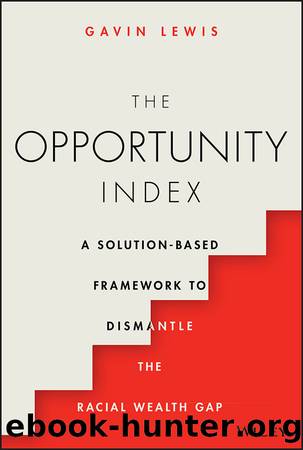The Opportunity Index by Gavin Lewis

Author:Gavin Lewis [Lewis, Gavin]
Language: eng
Format: epub
ISBN: 9781119840787
Publisher: Wiley
Published: 2023-03-01T00:00:00+00:00
6
Almonds
THERE ARE MANY SYMPTOMS OF socioeconomic disadvantage. The tendency is to focus on these rather than on the root cause. One of these symptoms is the treatment of Black people who find themselves requiring mental health services. This adversely impacts Black communities, and attempts to treat this need to be accelerated. But if we fail to resolve the negative experiences that lead to mental health challenges, it will continue to be an issue for many.
When people learn about my background and then my role in finance, they often ask me: What made you different? Certainly my mother played a pivotal role in my life. But it's a question I've never quite known how to answer. Achieving success in any field also brings with it the danger that you can begin to feel you are different, almost special. I've met many who have achieved amazing things, against the odds, but who have become arrogant. It also creates the impression that there is some hidden, innate quality that only a few people have. For the elite athlete or inspiring musician, perhaps this is true. But the corporate world is full of hard-working and competent people who simply attended the right school or were given the right advice. If we bestow some secret gift on those who didn't have these advantages yet managed to break into the world, then success is forever out of reach for the vast majority of people. And yet I must recognize that it is uncommon for someone with my background to hold a senior position in finance. So I usually shrug my shoulders and say, âI'm not sure.â But if I were to provide an honest response, I would say, âAlmonds.â
The amygdala is a small cluster of almond-shaped cells located near the base of the brain. We all have two of these groups, one in each hemisphere of our brain. The role of the amygdala is to regulate emotions such as joy, sadness, and happiness. It also preserves memories and attaches emotions to these memories, known as emotional remembrances. So we not only remember an interaction with a loved one but feel the emotion we attribute to that loved when recollecting them.1 The amygdala also plays an important role in activating the flight-or-fight response. When we feel we are in danger or facing a threat, the brain signals stress hormones to be released, which prepares the body to either flee or fight for survival. (There is a dog growling angrily at me. Do I run or prepare to fend it off?)
In another part of the brain are the frontal lobes, which are part of the cerebral cortex. The cerebral cortex regulates voluntary actions such as reasoning, movement, and decision-making. The frontal lobes have an important relationship with the amygdala because they allow us to evaluate our emotions and respond accordingly. (I see that although the dog is angry, it's on a leash and therefore my response is to walk away.) Both of these functions are vital to our survival and played a role in human evolution.
Download
This site does not store any files on its server. We only index and link to content provided by other sites. Please contact the content providers to delete copyright contents if any and email us, we'll remove relevant links or contents immediately.
International Integration of the Brazilian Economy by Elias C. Grivoyannis(57393)
The Radium Girls by Kate Moore(10918)
Turbulence by E. J. Noyes(7059)
Nudge - Improving Decisions about Health, Wealth, and Happiness by Thaler Sunstein(6643)
The Black Swan by Nassim Nicholas Taleb(6205)
Pioneering Portfolio Management by David F. Swensen(5616)
Rich Dad Poor Dad by Robert T. Kiyosaki(5167)
Zero to One by Peter Thiel(4835)
Man-made Catastrophes and Risk Information Concealment by Dmitry Chernov & Didier Sornette(4749)
Secrecy World by Jake Bernstein(3789)
Millionaire: The Philanderer, Gambler, and Duelist Who Invented Modern Finance by Janet Gleeson(3576)
Skin in the Game by Nassim Nicholas Taleb(3479)
The Age of Surveillance Capitalism by Shoshana Zuboff(3432)
The Money Culture by Michael Lewis(3292)
Skin in the Game: Hidden Asymmetries in Daily Life by Nassim Nicholas Taleb(3273)
Bullshit Jobs by David Graeber(3190)
The Dhandho Investor by Mohnish Pabrai(3176)
The Wisdom of Finance by Mihir Desai(3087)
Blockchain Basics by Daniel Drescher(2896)
